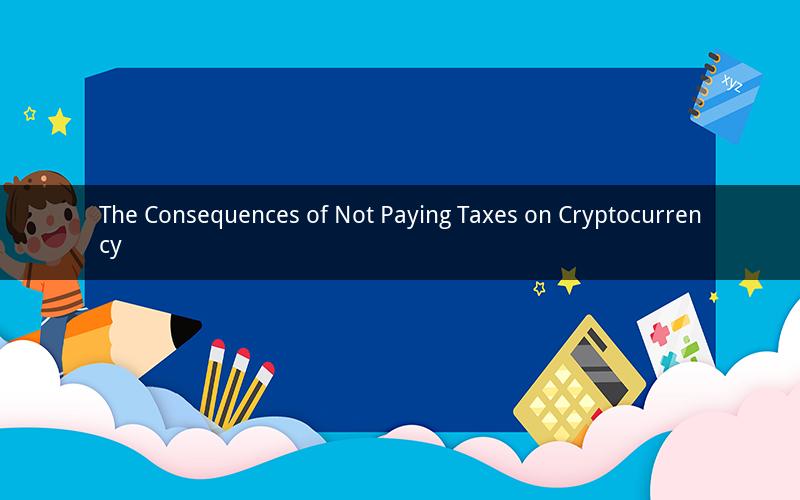
In recent years, cryptocurrencies have become increasingly popular as a means of exchange and investment. However, many individuals and businesses are unaware of the tax implications associated with owning and trading digital currencies. Failing to pay taxes on cryptocurrency can lead to severe consequences. This article explores the potential repercussions of not paying taxes on crypto, including legal penalties, financial liabilities, and damage to one's reputation.
1. Legal Penalties
One of the most immediate consequences of not paying taxes on cryptocurrency is the risk of facing legal penalties. Tax authorities around the world are increasingly cracking down on individuals and businesses that fail to report their crypto earnings. These penalties can include fines, interest charges, and even criminal charges in some cases.
For example, in the United States, the Internal Revenue Service (IRS) has been actively pursuing taxpayers who fail to report their crypto income. The IRS has the power to impose penalties of up to 25% of the unpaid tax, along with interest charges that can accumulate over time. In extreme cases, taxpayers may also face criminal charges, including fraud or tax evasion, which can result in fines and imprisonment.
2. Financial Liabilities
In addition to legal penalties, failing to pay taxes on cryptocurrency can also result in significant financial liabilities. When individuals or businesses fail to report their crypto earnings, they may be required to pay back taxes, along with interest and penalties. This can lead to a substantial financial burden, especially if the amount of tax owed is large.
Moreover, if tax authorities discover unreported crypto earnings, they may also assess additional penalties and interest charges. This can further increase the financial liabilities, making it even more difficult for individuals or businesses to pay their tax obligations.
3. Reputation Damage
Another consequence of not paying taxes on cryptocurrency is the potential damage to one's reputation. Tax evasion is considered a serious offense, and individuals who are caught engaging in such activities may be viewed as untrustworthy or unethical. This can have long-lasting effects on one's personal and professional life.
For businesses, reputation damage can be particularly damaging. Customers, partners, and investors may lose confidence in a company that is associated with tax evasion. This can lead to a loss of business, decreased sales, and a negative impact on the company's overall reputation.
4. Increased Risk of Audits
Failing to pay taxes on cryptocurrency can also increase the risk of future audits. Tax authorities are likely to scrutinize individuals and businesses who have a history of unreported crypto earnings. This can result in additional audits, investigations, and the potential for further penalties and fines.
5. Impact on Future Tax Planning
Lastly, not paying taxes on cryptocurrency can impact one's future tax planning. When individuals or businesses fail to report their crypto earnings, they may find it difficult to accurately calculate their tax liabilities in the future. This can lead to underpayment or overpayment of taxes, which can result in additional penalties and interest charges.
To mitigate these risks, it is crucial for individuals and businesses to understand the tax implications of owning and trading cryptocurrencies. Here are five frequently asked questions about paying taxes on crypto:
1. Q: Do I need to pay taxes on cryptocurrency if I didn't sell or trade it?
A: Yes, you may still need to pay taxes on cryptocurrency even if you didn't sell or trade it. If you received cryptocurrency as a gift, inheritance, or as part of a salary, you may be required to report it and pay taxes on any gains.
2. Q: What is the capital gains tax rate for cryptocurrency?
A: The capital gains tax rate for cryptocurrency depends on your country of residence and the length of time you held the asset. In some countries, short-term gains (held for less than a year) are taxed at a higher rate than long-term gains (held for more than a year).
3. Q: Can I deduct cryptocurrency losses on my taxes?
A: Yes, you can deduct cryptocurrency losses on your taxes, similar to losses on other investments. However, you must have a capital loss, and the deduction is subject to certain limitations.
4. Q: How do I report cryptocurrency gains on my tax return?
A: To report cryptocurrency gains on your tax return, you will need to keep detailed records of your crypto transactions, including the date, amount, and value of the cryptocurrency. You can use a cryptocurrency tax calculator or consult with a tax professional to ensure accurate reporting.
5. Q: Can I avoid paying taxes on cryptocurrency by using a foreign wallet or exchange?
A: No, using a foreign wallet or exchange does not exempt you from paying taxes on cryptocurrency. Tax authorities can track cryptocurrency transactions, and failing to report your crypto earnings can still result in legal penalties and financial liabilities.
In conclusion, failing to pay taxes on cryptocurrency can have serious consequences, including legal penalties, financial liabilities, reputation damage, increased risk of audits, and impact on future tax planning. It is essential for individuals and businesses to understand the tax implications of owning and trading cryptocurrencies and to comply with their tax obligations to avoid these negative repercussions.